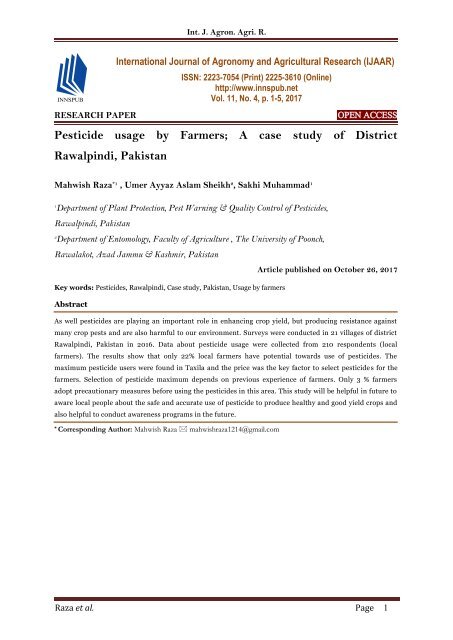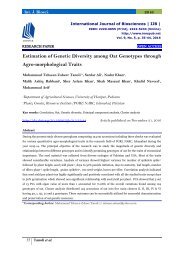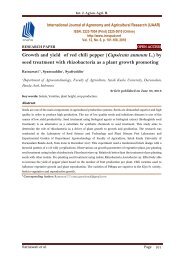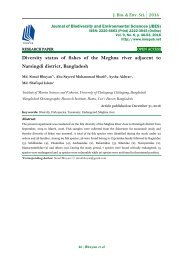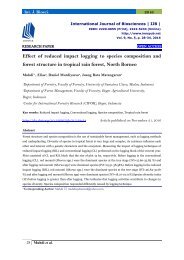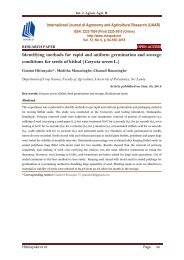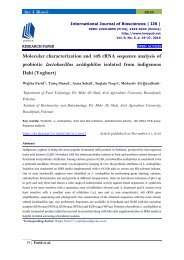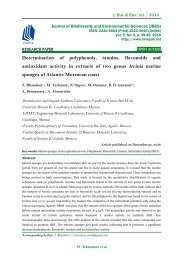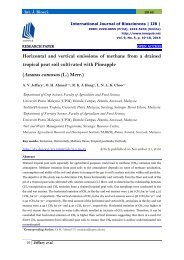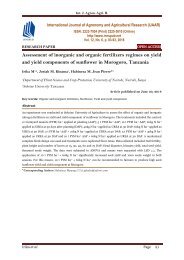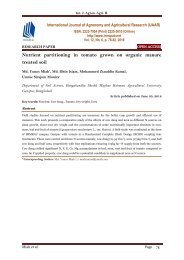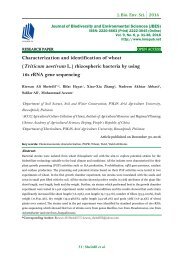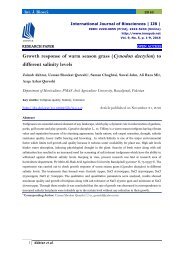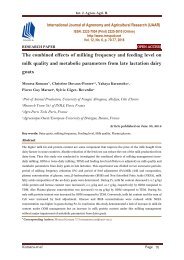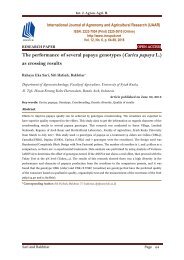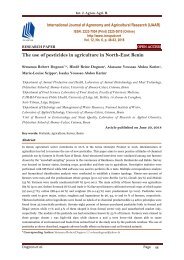Pesticide usage by Farmers; A case study of District Rawalpindi, Pakistan
Abstract As well pesticides are playing an important role in enhancing crop yield, but producing resistance against many crop pests and are also harmful to our environment. Surveys were conducted in 21 villages of district Rawalpindi, Pakistan in 2016. Data about pesticide usage were collected from 210 respondents (local farmers). The results show that only 22% local farmers have potential towards use of pesticides. The maximum pesticide users were found in Taxila and the price was the key factor to select pesticide s for the farmers. Selection of pesticide maximum depends on previous experience of farmers. Only 3
Abstract
As well pesticides are playing an important role in enhancing crop yield, but producing resistance against many crop pests and are also harmful to our environment. Surveys were conducted in 21 villages of district Rawalpindi, Pakistan in 2016. Data about pesticide usage were collected from 210 respondents (local farmers). The results show that only 22% local farmers have potential towards use of pesticides. The maximum pesticide users were found in Taxila and the price was the key factor to select pesticide s for the
farmers. Selection of pesticide maximum depends on previous experience of farmers. Only 3
You also want an ePaper? Increase the reach of your titles
YUMPU automatically turns print PDFs into web optimized ePapers that Google loves.
Int. J. Agron. Agri. R.<br />
RESEARCH PAPER<br />
OPEN ACCESS<br />
<strong>Pesticide</strong> <strong>usage</strong> <strong>by</strong> <strong>Farmers</strong>; A <strong>case</strong> <strong>study</strong> <strong>of</strong> <strong>District</strong><br />
<strong>Rawalpindi</strong>, <strong>Pakistan</strong><br />
International Journal <strong>of</strong> Agronomy and Agricultural Research (IJAAR)<br />
ISSN: 2223-7054 (Print) 2225-3610 (Online)<br />
http://www.innspub.net<br />
Vol. 11, No. 4, p. 1-5, 2017<br />
Mahwish Raza *1 , Umer Ayyaz Aslam Sheikh 2 , Sakhi Muhammad 1<br />
1<br />
Department <strong>of</strong> Plant Protection, Pest Warning & Quality Control <strong>of</strong> <strong>Pesticide</strong>s,<br />
<strong>Rawalpindi</strong>, <strong>Pakistan</strong><br />
2<br />
Department <strong>of</strong> Entomology, Faculty <strong>of</strong> Agriculture , The University <strong>of</strong> Poonch,<br />
Rawalakot, Azad Jammu & Kashmir, <strong>Pakistan</strong><br />
Article published on October 26, 2017<br />
Key words: <strong>Pesticide</strong>s, <strong>Rawalpindi</strong>, Case <strong>study</strong>, <strong>Pakistan</strong>, Usage <strong>by</strong> farmers<br />
Abstract<br />
As well pesticides are playing an important role in enhancing crop yield, but producing resistance against<br />
many crop pests and are also harmful to our environment. Surveys were conducted in 21 villages <strong>of</strong> district<br />
<strong>Rawalpindi</strong>, <strong>Pakistan</strong> in 2016. Data about pesticide <strong>usage</strong> were collected from 210 respondents (local<br />
farmers). The results show that only 22% local farmers have potential towards use <strong>of</strong> pesticides. The<br />
maximum pesticide users were found in Taxila and the price was the key factor to select pesticide s for the<br />
farmers. Selection <strong>of</strong> pesticide maximum depends on previous experience <strong>of</strong> farmers. Only 3 % farmers<br />
adopt precautionary measures before using the pesticides in this area. This <strong>study</strong> will be helpful in future to<br />
aware local people about the safe and accurate use <strong>of</strong> pesticide to produce healthy and good yield crops and<br />
also helpful to conduct awareness programs in the future.<br />
* Corresponding Author: Mahwish Raza mahwishraza1214@gmail.com<br />
Raza et al. Page 1
Int. J. Agron. Agri. R.<br />
Introduction<br />
Agriculture plays an important role directly and<br />
indirectly in generating economic growth.<br />
It provides food to the population and contributes<br />
substantial share <strong>of</strong> foreign exchange for the country.<br />
In spite <strong>of</strong> structural shift towards industry,<br />
agriculture is still the largest sector in the economy<br />
and contributes 21.8 percent <strong>of</strong> the GDP. Its<br />
contribution in total employment is also significant.<br />
Materials and methods<br />
Study was conducted in <strong>Rawalpindi</strong> district which<br />
consist <strong>of</strong> seven Tehsils including <strong>Rawalpindi</strong>, Taxila,<br />
Kahuta, Gujar Khan, Kallar Syedan, Murree and Kotli<br />
Sattian. It has an area <strong>of</strong> 5,286 km 2 (2,041 sq mi).<br />
It is situated on the southern slopes <strong>of</strong> the northwestern<br />
extremities <strong>of</strong> the Himalayas, including large<br />
mountain tracts with rich valleys traversed <strong>by</strong><br />
mountain rivers.<br />
It provides employment to over 44 percent <strong>of</strong> total<br />
employed labour force (Federal Bureau <strong>of</strong> Statistics,<br />
2008-2009).<br />
Area is lie between 450 m to 2290 m altitude (Table<br />
1) with diverse vegetation pattern both wild and<br />
crops.<br />
<strong>Pesticide</strong> application is an essential component <strong>of</strong><br />
modern crop production technology. Their use has<br />
been contentiously increasing over the past decades.<br />
In <strong>Pakistan</strong> the pesticides application is maximum on<br />
cotton crop followed <strong>by</strong> fruits and vegetables.<br />
Insecticides, herbicides and fungicides are commonly<br />
used for crop protection throughout the country.<br />
However, among all categories, insecticides are used<br />
more frequently.<br />
After ban, over the use <strong>of</strong> organochlorine insecticides<br />
in 80's (Parveen and Masud 2003),<br />
organophosphates, synthetic pyrethroids and<br />
carbamates are presently in use with less persistence.<br />
Most pesticides used in <strong>Pakistan</strong> were insecticides<br />
(74%), followed <strong>by</strong> herbicides (14%), fungicides (9%),<br />
acaricides (2%), and fumigants (1%) (Khan, 1998).<br />
Province-wise share <strong>of</strong> pesticide market was 90<br />
percent for the Punjab, 8 percent for Sindh and 2<br />
percent for NWFP and Balochistan (Khan, 2000).<br />
<strong>Pesticide</strong> residues may enter the food chain causing<br />
serious hazards to human and animal lives (Khan et<br />
al., 2007). Despite the fact that pesticides are used<br />
with the aim <strong>of</strong> controlling insects, diseases, fungi and<br />
other pests along with their other beneficial effect,<br />
leave trace amounts <strong>of</strong> residues on fruits and<br />
vegetables (Basa Cesnik et al., 2007; Anwar et al.,<br />
2011).<br />
Tehsil Murree, Kahuta and Kotli Sattian are consists<br />
<strong>of</strong> mountains as compared to <strong>Rawalpindi</strong>, Taxila,<br />
Gujar Khan and Kallar Syedan. Wheat and Maize are<br />
major crops along with vegetables and fruits<br />
orchards.<br />
Surveys were conducted in 21 different villages<br />
together with three villages from each Tehsil. A Total<br />
<strong>of</strong> 210 respondents (Local farmers; 10 Respondents<br />
from each village) were selected <strong>by</strong> using Fitzgibbon<br />
et al. (1987). Keeping in view the objectives <strong>of</strong> the<br />
<strong>study</strong> a questioner was developed to collect data from<br />
local farmers. The data thus collected were analyzed<br />
<strong>by</strong> using SPSS (Statistical Package for Social Sciences)<br />
s<strong>of</strong>tware.<br />
Results and discussion<br />
To keep and maintain crops healthy and free from<br />
damaging factors, safe and accurate use <strong>of</strong> pesticides<br />
<strong>by</strong> the farmers is a key factor to improve yield/acre.<br />
Present <strong>study</strong> shows that the potential <strong>of</strong> local<br />
farmers towards use <strong>of</strong> pesticides is very low in<br />
district <strong>Rawalpindi</strong>; only 22 % respondents were<br />
using pesticides and 78% were not applying these<br />
chemicals on their crops (Table 2).<br />
The main reason <strong>of</strong> this low potential towards<br />
pesticides may be small land units or less relies on<br />
local agricultural productions in this area.<br />
Raza et al. Page 2
Int. J. Agron. Agri. R.<br />
Table 1. Global positions and vegetation type <strong>of</strong> survey sites in <strong>Rawalpindi</strong> district.<br />
Tehsils Altitude Latitiude Crops<br />
Gujar Khan 450 33°16’ 19" N<br />
73°19’ 32" E<br />
Wheat+Maize, Vegetables+Citrus<br />
Kahuta 605 33°59’00" N<br />
73°39’ 21" E<br />
Kallar Syedan 520 33°24'59" N<br />
73°22'39." E<br />
Kotli Sattian 1435 33° 80' 0"N<br />
73° 52' 24" E<br />
Murree 2290 33° 35' 02" N<br />
73° 27' 12" E<br />
<strong>Rawalpindi</strong> 508 33° 59' 85" N<br />
72° 97' 74" E<br />
Taxila 550 33° 74' 40" N<br />
72° 85' 58" E<br />
Wheat+Maize, Vegetables<br />
Wheat+Maize, Vegetables+Orchards<br />
Wheat+Maize, Vegetables+Orchards<br />
Orchards (Apple, Peach, Loqout, Pear)<br />
Wheat+ Maize, Vegetables+Orchards<br />
Wheat+ Maize, Vegetables+Orchards<br />
Table 2. Distribution <strong>of</strong> farmers according to <strong>usage</strong> <strong>of</strong> pesticides.<br />
Usage <strong>of</strong> pesticides f. Percentage (%)<br />
Yes 47 22<br />
No 163 78<br />
Total 210 100<br />
Results about control methods shows that 74% <strong>of</strong><br />
farmer <strong>of</strong> this area were found with no practice<br />
against insect pests and 22% famer were recorded<br />
with <strong>usage</strong> <strong>of</strong> chemical pesticides to manage their<br />
crops. There were no significant trend found towards<br />
mechanical control (1.6%) and biological control<br />
(0.8%) <strong>by</strong> local farmers (Table 3).<br />
Table 3. Distribution <strong>of</strong> farmers according type <strong>of</strong> control they emphasize.<br />
Usage <strong>of</strong> pesticides f. Percentage (%)<br />
Biological 2 0.80<br />
Chemical 47 22<br />
Mechanical 4 1.6<br />
None <strong>of</strong> them 157 74<br />
Total 210 100<br />
Taxila was found with maximum <strong>usage</strong> <strong>of</strong> pesticides<br />
(31.91%) followed <strong>by</strong> Gujar Khan with 21.27% and<br />
minimum was recorded in <strong>case</strong> <strong>of</strong> Kotli Sattian and<br />
Muree respectively (Table 4). Taxila was found with<br />
maximum <strong>usage</strong> because it is largest vegetable<br />
growing area <strong>of</strong> <strong>Rawalpindi</strong> district and famers use<br />
more spray on these crops in this region. From survey<br />
it was observed that. Taxila was equipped with more<br />
vegetables production and citrus orchards followed <strong>by</strong><br />
Gujar khan, where farmers use pesticides/<br />
Raza et al. Page 3
Int. J. Agron. Agri. R.<br />
insecticides to prevent diseases/insect attack and to<br />
improve yield. The main crops <strong>of</strong> Tehsil Gujar khan<br />
are pulses, gram and groundnut. Kahuta, Kotli Sattian<br />
and Murree these three tehsil having mountainous<br />
areas where mostly apple, peach, walnut were grown<br />
and these were found with minimum use <strong>of</strong> pesticides<br />
due to this.<br />
Table 4. Distribution <strong>of</strong> Tehsils according to the <strong>usage</strong> <strong>of</strong> pesticides.<br />
Tehsils f. Percentage (%)<br />
<strong>Rawalpindi</strong> 7 14.89<br />
Taxila 15 31.91<br />
Gujar Khan 10 21.27<br />
Kallar Syedan 6 12.76<br />
Kahuta 5 10.63<br />
Kotli Sattian 2 4.25<br />
Murree 2 4.25<br />
Total 47 100<br />
In the present survey it was recorded that 45% famers<br />
<strong>of</strong> this area were habitual to use precautionary<br />
measures during the <strong>usage</strong> <strong>of</strong> pesticides on their crops<br />
or fruits orchard. Forty one percent (41 %) farmers<br />
were those who adopt precautionary measures<br />
occasionally and 44% were found who never use any<br />
preventive measure to use pesticides (Table 5). One <strong>of</strong><br />
the main reasons <strong>of</strong> this response is because these are<br />
remote areas <strong>of</strong> this region. There is lack <strong>of</strong> awareness<br />
about pesticides hazards and low literacy rate <strong>of</strong> local<br />
farmers in these areas.<br />
Table 5. Distribution <strong>of</strong> farmers according to use <strong>of</strong> precautionary measures while spraying.<br />
Usage <strong>of</strong> pesticides f. Percentage (%)<br />
Yes 7 45.<br />
Occasionally 19 41<br />
Never 21 44<br />
Total 47 100<br />
In <strong>Rawalpindi</strong> district 41% pesticides user consider<br />
their previous experience during selection or<br />
purchasing <strong>of</strong> pesticides and 29% farmers give<br />
preference to expert opinion. Only 4% accept new<br />
research about pesticides and reaming farmers<br />
preferred 11% and 15% price and efficacy <strong>of</strong> pesticides<br />
respectively when they want to purchase pesticides<br />
for their crops (Table 6).<br />
Table 6. Distribution <strong>of</strong> farmers to their consideration while purchasing <strong>of</strong> insecticides/ <strong>Pesticide</strong>s.<br />
Considering while purchasing <strong>of</strong> insecticides/ <strong>Pesticide</strong>s f. Percentage (%)<br />
Previous Experience 19 41<br />
Price 5 11<br />
Efficacy <strong>of</strong> Insecticides/ <strong>Pesticide</strong>s 7 15<br />
New research 2 4<br />
Expert Opinion 14 29<br />
Total 47 100<br />
Conclusion<br />
It is concluded from the survey that use <strong>of</strong> pesticides<br />
<strong>by</strong> local farmers is not very common. And there is a<br />
need <strong>of</strong> awareness about safe and accurate use <strong>of</strong><br />
pesticides for better production <strong>of</strong> local crops.<br />
Training and non-formal teaching <strong>of</strong> cotton growers<br />
is required for proper handling <strong>of</strong> pesticides<br />
according to Integrated Pest Management<br />
requirements.<br />
Raza et al. Page 4
Int. J. Agron. Agri. R.<br />
This survey will be helpful in the future to conduct<br />
awareness programs for farmers <strong>of</strong> this area. It also<br />
will be helpful to estimate the pesticide hazards in<br />
<strong>Rawalpindi</strong> district.<br />
Reference<br />
Anwar T, Ahmed I, Seema T. 2011.<br />
Determination <strong>of</strong> pesticide residues in fruits <strong>of</strong><br />
Nawabshah <strong>District</strong>, Sindh, <strong>Pakistan</strong>. Pak. J. Bot.,<br />
43(2), 1133-1139.<br />
Basa CH, Gregorcic A, Velikonja BS, Kmecl V.<br />
2007. <strong>Pesticide</strong> residues in agricultural produce <strong>of</strong><br />
Slovene origin in the period from 2001 to 2005. Acta<br />
alimentaria, 36(2), 269-282.<br />
Federal Bureau <strong>of</strong> Statistics. 2008-09. Ministry<br />
<strong>of</strong> Finance, Govt. <strong>of</strong> <strong>Pakistan</strong>, Islamabad Fitzgibbon,<br />
C. Taylor and L.L. Morris. 1987. How to design a<br />
programme evaluation New burry Park CA: Sage.<br />
Parveen Z, Masud SZ. 2003. Monitoring <strong>of</strong><br />
pesticide residues in human milk. Pak. J Sci. Ind Res.,<br />
46, 43-46.<br />
Khan AM. 2000. <strong>Pakistan</strong> agricultural pesticides<br />
association. Internet page, at URL:<br />
www.cpp.org.pk/Assoc/associations.html.<br />
Khan MS. 1998. <strong>Pakistan</strong> crop protection market.<br />
PAPA bulletin, Volume 9, 7- 9.<br />
Khan IAT0, Parveen Z, Riazuddin, Ahmed M.<br />
2007. Multi-residue determination <strong>of</strong><br />
organophosphorus pesticides and synethetic<br />
pyrethroids in wheat. Int. J. Agric. Biol., 6(9), 905-<br />
908.<br />
Raza et al. Page 5


